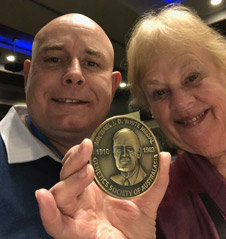Monday 9 July 2018 12:17pm

Professor Neil Gemmell (left) with his PhD mentor Professor Jenny Graves, FAA, AO, Prime Minister’s Science Prize winner 2017, and recipient of the first MJD White Medal in 2009.
Professor Neil Gemmell’s unique contributions to the field of genetics have been recognised on the international stage.
He received the Genetics Society of AustralAsia (GSA) MJD White Medal at the Society’s conference in Canberra last week.
Organisers say the medal is the Society’s most honoured award, which is given to those who have made substantial contributions to the community.
It is the first time the award, established in 2009 to commemorate Michael White who, in 1953, proposed the formation of the society, has been bestowed upon a New Zealand-based academic.
Professor Gemmell, of the Department of Anatomy, was “pretty chuffed” by the honour.
“It is nice to be recognised by my peers and is especially significant to me as GSA was the first professional society I joined.”
As the Chair for AgResearch Centre for Reproduction and Genomics, he carries out world-leading research blending ecology, population, conservation, and evolutionary biology, with cutting-edge genome technology.
“Genetics is a fast paced and exciting field that impacts on health, ecology, and our productive sectors.
“I have had the privilege to be at the forefront of a revolution in our understanding of ourselves and other species that has been unlocked through the power of genetics, and, more recently, genomics,” he says.
"I have had the privilege to be at the forefront of a revolution in our understanding of ourselves and other species that has been unlocked through the power of genetics, and, more recently, genomics."
A recurring theme in his research is that of reproduction, with past and current projects spanning mating systems and mate choice, sperm-egg interactions, sperm function, sex determination, sex allocation, and inter-sexual genomic conflict.
He also has interests in several congruent fields of research, particularly the evolution of the mitochondrial genome, the evolution of microsatellite DNA, the evolution of sex determining mechanisms and the processes that lead to speciation.
“As a researcher, my most influential idea thus far has been the observation that variants in some components of our genome, notably the maternally inherited mitochondrial genome, can have different effects on reproduction and survival in males versus females – an idea I termed ‘Mother's Curse’. Over the last ten years, I have sought to understand these mutations and have explored the potential to harness these variants as a means of population control of pest species.”
Recently, he has captured hearts and minds around the world with his Loch Ness eDNA project to document what species live in the famous body of water.
Reflecting on his career so far, he says his biggest achievement has been training and mentoring more than 100 students and research staff, many of whom have gone on to achieve scientific and other successes.
